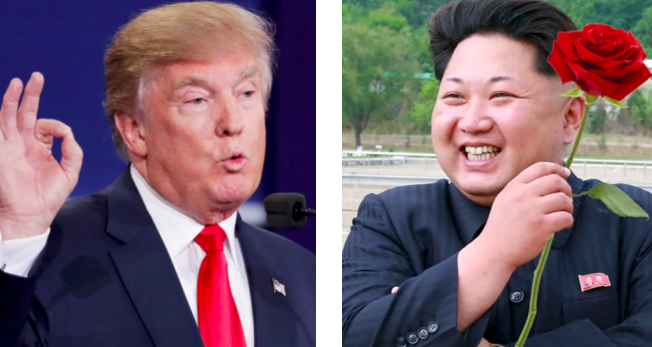“Kim Jong-un’s shift towards diplomacy should not be interpreted as a capitulation to American demands, but a calculated strategy in dealing with President Trump’s bellicose approach. Utilising well-versed tactics of ‘strategic patience’, Kim’s aim is to simply ‘wait out’ the current president and break out of diplomatic isolation to win de-facto acceptance of his nuclear capabilities.” Tom Fowdy, a postgraduate student of Chinese studies at Oxford University, examines what lies behind the apparent thawing of tensions on the Korean peninsula…

The world is certainly relieved. Little more than a year ago nerves were high and hopes were low concerning the potential outbreak of hostilities on the Korean peninsula.
Trump had made the denuclearisation of North Korea his primary foreign policy goal and had vowed to achieve it by one way or another — even if that meant a resort to force.
Simultaneously, Pyongyang proceeded with a barrage of missile testing, including two international continental ballistic tests, two missiles over Japanese airspace and even a nuclear test.
Neither side backed down and mutual threats abounded, with Trump even threatening to destroy the country with “fire and fury”.
Yet, come 2018, this seems almost a distant memory. In the short space of a month the North opened talks with the South, Trump pledged to meet Kim, the latter visited Beijing, the director of the CIA visited Pyongyang and talk of “peace treaties” and “denuclearisation” ring through the air.
Some have declared this a foreign policy success for the president, arguing that his pressure, unpredictability and “madman” diplomacy has forced Kim to the negotiating table — cornered and facing dire consequences.
While it could be argued that North Korea feared an attack, to chalk this up as a victory for Trump underestimates the resolve and strategy of the North Korean regime, which I believe will outmanoeuvre the president with tactical diplomacy.
Although North Korea is often portrayed as an irrational, unhinged and reckless regime, this could not be further from the truth. Every move and decision the country makes concerning its foreign policy is rational, determined and calculated with precision to the political context around it, as well as the constantly fluctuating “red-lines” as to what it can and cannot get away with.
Since the 1990s — after the fall of the Soviet bloc — the overriding goal of the regime has been to secure its own survival in a world dominated by the United States.
This primarily involves preventing an American led “intervention” to topple the regime, as has been seen in Iraq and Libya — and attempted in Syria. It is also about finding a way for the regime to survive as it is, without making concessions to the international community on things such as human rights and liberalisation.
The regime’s ideology, Juche (self-reliance), teaches that North Korea must resist “domination” by the external world and rather struggle against its circumstances to re-shape them into an environment that is favourable — in other words, resist fate.
As a result, on every count, nuclear weaponry becomes the pinnacle of the regime’s survival strategy in a hostile world. While it has been speculated that North Korea could randomly and irrationally attack America, these weapons are not for offensive usage, but for leverage and symbolism in negotiations. They force other countries to take the regime seriously.
Although this has made North Korea pay a heavy price in terms of sanctions, we can see already it has worked as intended — Kim Jong-un gets to meet Donald Trump, but also China’s Xi Jinping, South Korea’s Moon Jae-in and potentially Russia’s Putin and Japan’s Abe Shinzo. All of this elevates the status of the North Korean leader on the international stage. No longer is Kim Jong-un an estranged, rejected and isolated pariah in global politics, but a serious player. This legitimates the regime in a world that truly expected it to disappear after 1991.
By this reading, why would North Korea capitulate so easily to American terms and be prepared to surrender everything to its primary adversary? The short answer is… it isn’t.
North Korea knows it cannot trust America. It knows full well if it does everything America wants and denuclearises, that US ambitions to change the regime would not go away — because that is not how America works.
After all, do you think that Trump and the Republican Party’s efforts to tear up Obama’s deals with Cuba and Iran have gone unnoticed? Or how Libya’s Gaddafi scrapped his nuclear programme, and then got toppled anyway?
In this context, North Korea isn’t going to surrender to Trump but will simply exercise strategic patience in “waiting him out”. They will certainly talk the talk, they will say the things he wants to hear and ensure he can believe he has “won” — but ultimately kick the can down the road and drag things out as long as possible.
After all, Kim is leader for life, but Trump can be leader for eight years at most.
There are some who argue that sanctions are forcing North Korea to concede. This is also misleading. Not only has the impact of the sanctions been exaggerated, but North Korea is prepared to absorb some pain to fulfil its long-term strategic goals — Juche is all about endurance.
Secondly, the real sanctions enforcer is not America, but China. They will relax enforcement when North Korea comes to the table and doesn’t provoke — we’re already seeing signs of this happening.
Therefore, the immediate future is likely to see continuing moves towards peace and reconciliation, but no instantaneous end to the nuclear programme. North Korea recognises Trump’s approach and are primarily responding to sap his political momentum while simultaneously pocketing the massive technological leaps made in nuclear and missile technology.
In this case Trump, so eager to prove himself a hero, may show himself to be a fool in the long run. He simply doesn’t have the leverage — or the time — to rein in North Korea.

Comments are closed.